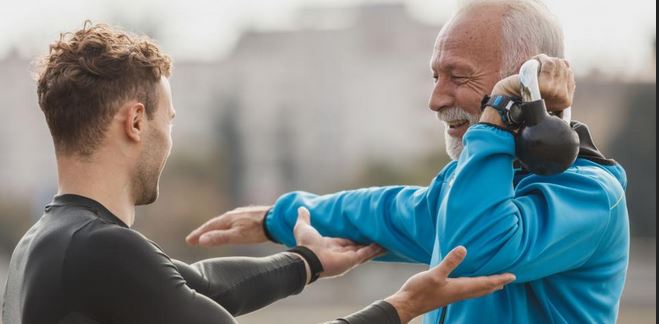Picture this: You’re 75, still crushing your morning workout while younger guys struggle to keep up. Your mind is razor-sharp. You remember names, solve problems, and think clearly. This isn’t luck – it’s the power of consistent exercise protecting your brain through the decades.
The Brutal Truth About Aging Without Exercise
Here’s what most men don’t want to hear. Your brain starts shrinking after age 40. Without intervention, you’ll lose cognitive speed, memory sharpness, and mental clarity. Research involving over 341,000 people shows that men who stay physically active dramatically slow this decline.
But here’s the game-changer: Exercise doesn’t just maintain your brain – it actively strengthens it.
As David Goggins says, “You have to be willing to suffer in ways that others won’t.” This applies to your mental fitness too. The men who stay mentally sharp into their 70s and 80s are the ones who embrace the discomfort of consistent exercise.
The Science is Clear: Exercise Rewires Your Brain
The research is overwhelming. Here’s what happens when you exercise regularly:
Your Brain Gets Bigger: Studies show that physical activity is associated with better late-life cognition, with specific benefits to memory centers and executive function areas.
Better Blood Flow: Healthy men aged 18-79 with better aerobic fitness had 17% higher cerebral blood flow compared to their sedentary counterparts. More blood means more oxygen and nutrients feeding your brain.
Stronger Neural Connections: Physical training for up to 12 weeks had a moderate effect on cognitive status with significant improvements in mental performance.
The Harvard Aging Study followed men for 30 years and found something remarkable: In just three weeks of bed rest, 20-year-olds developed many physiologic characteristics of men twice their age. The opposite is also true – exercise can reverse decades of decline.
The 40% Rule Applied to Mental Fitness

Goggins teaches us about the 40% Rule – when you think you’re done, you’ve only used 40% of your capacity. This applies to your brain too. As Goggins puts it: “Motivation fades, but discipline endures.”
Your brain operates the same way. Most men give up on mental challenges too early. They accept “senior moments” as inevitable. But research shows that aerobic or resistance training interventions significantly improved cognitive ability in older adults across multiple mental tests.
The Male Brain Advantage: How Exercise Hits Different
Men respond uniquely to exercise’s cognitive benefits. Even stronger effect-sizes were observed for men with odds ratios ranging from 3.5 to 4.8 when it came to mental health improvements from physical activity.
Why This Matters for Men:
- We typically have more muscle mass to work with
- Our cardiovascular systems respond robustly to training
- We often thrive on competitive, goal-oriented exercise
- The discipline required builds mental resilience
The key finding: Physical activity was associated with follow-up global cognition and showed significant positive associations that lasted for decades.
Take Action: Your Mental Fitness Blueprint
1. Start with “Minimum Effective Dose” Training
Don’t go zero to hero. Begin with 150 minutes of moderate exercise weekly. This could be:
- 30 minutes of brisk walking, 5 days a week
- 20 minutes of cycling, every other day
- Weekend hiking plus two weekday gym sessions
2. Add Resistance Training (Non-Negotiable)
Researchers highlighted neural growth factors as the main molecules synthesized during resistance exercises that create more significant brain benefits compared to cardio alone.
Try this weekly:
- 2-3 strength training sessions
- Focus on compound movements (squats, deadlifts, presses)
- Progressive overload – gradually increase weight or reps
3. Embrace “Cognitive Cross-Training”
Mix different types of exercise to challenge your brain:
- Boxing (coordination + reaction time)
- Dancing (memory + rhythm)
- Sports (strategy + quick decisions)
4. The Goggins Approach
Make It Uncomfortable, David Goggins advocates for a discipline of routine exercises, highlighting that each workout not only strengthens the body but also fortifies the mind against adversity.
Push yourself regularly:
- Add interval training once weekly
- Try new activities that challenge coordination
- Set physical goals that require mental toughness
5. Track Your “Brain Gains”
Monitor improvements in:
- Memory (remembering names, directions, lists)
- Focus (sustained attention on tasks)
- Problem-solving speed
- Mood and energy levels
Try This Today
Pick one action and do it within the next 2 hours:
Beginner: Take a 20-minute walk around your neighborhood. Pay attention to details you usually miss.
Intermediate: Schedule three 45-minute workout sessions for this week. Include both cardio and strength training.
Advanced: Add a new physical challenge to your routine. Try rock climbing, martial arts, or a sport you’ve never played.
The Goggins Challenge: When you feel like stopping during your workout, push for an additional 60% of whatever you were planning. This workout isn’t about fixed numbers but about rewiring your mind to embrace discomfort and push beyond perceived limits.
The Bottom Line
Exercise is the closest thing we have to a fountain of youth for your brain. The research across hundreds of thousands of men shows that staying physically active doesn’t just slow cognitive decline – it actively improves mental performance.
Key Takeaway: Your brain at 70 can be sharper than it was at 50, but only if you’re willing to put in the work today. Every workout is a deposit in your cognitive bank account.
Tomorrow, “Long-term vs. Short-term Goals: Balancing Both for Mental Health” – We’ll explore how to set goals that keep you motivated without burning out, using techniques that work specifically for the male mindset.
🏃 Move your body, lift your mood
Resources
- Physical Activity and Cognitive Decline Among Older Adults – JAMA Network Open
- Can physical activity improve the mental health of older adults? – PMC
- Exercise and aging: Can you walk away from Father Time – Harvard Health
- Physical exercise and mental health among older adults – Frontiers
- What Are the Benefits of Exercise on Aging? – NCOA
- Exercise helps sustain mental activity as we age – American Psychological Association
- The Effects of Exercise for Cognitive Function in Older Adults – PMC
- Exercise, cognition, and the aging brain – Journal of Applied Physiology
- Physical exercise, cognition, and brain health in aging – ScienceDirect
- Building Mental Toughness: The David Goggins Approach – Medium

Leave a Reply